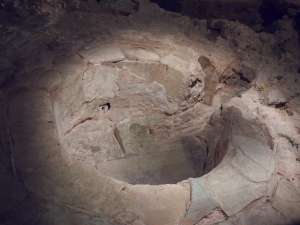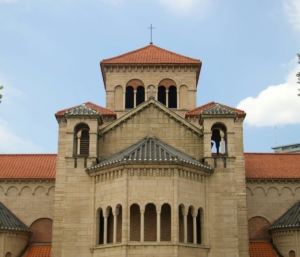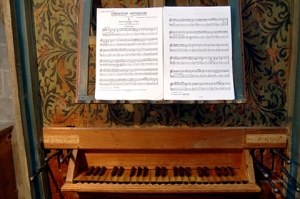(HT: Particular Voices) The two testaments are the Covenant of works and the Covenant of grace, one promising life eternal to him that does all things contained in the law; the other to him turns and believes in Christ. And it must . . . Continue reading →
Search results for “William Perkins”
Perkins on “The Law is Not of Faith”
Thanks to Particular Voices for posting a page from William Perkins’ commentary on Galatians 3:12. Thanks to Rich Barcellos for pointing me to it. I took the liberty of transcribing the text and updating the spelling to make it more accessible. Perkins . . . Continue reading →
A Review Of The New Anglican Catechism And What It Says About The State Of Anglicanism
As I emerged out of Southern Baptist evangelicalism in 1980–81 John Stott and J. I. Packer were two of the most influential writers in my journey out of Baptist evangelicalism. Hitherto my theological staples had been things on the order of Navigators Bible study materials and Rosalind Rinker’s book on hearing voices from God. I am not entirely sure how I found Stott’s Basic Christianity and Packer’s Evangelism and the Sovereignty of God. Back then we had a Christian bookstore downtown, where I mostly bought contemporary Christian records (e.g., Larry Norman and Barry McGuire). Perhaps the manager directed me to them? Those books were a Godsend. They were thoughtful, intelligent, gracious and thoroughly evangelical in the best sense of the word. They were gospel books. They pointed me away from myself and my experience and toward Christ. In the summer of 1981 Packer’s Knowing God was a major influence in my embrace of Reformed theology, piety, and practice. Continue reading →
Can Baptists Be Catholic? (Part 1)
Whether Baptists can be catholic is a serious question that requires a serious answer. Before we proceed, however, we must define our terms. What is catholicity? Our English word catholic is really a Greek word, katholikos (καθολικός), borrowed by English. What does . . . Continue reading →
A Critical Appreciation Of Anglicanism (Or Why I Did Not Become Anglican)
Regular readers of this space will know that evangelical elements of the Anglican tradition have played a significant role in my spiritual development. As a very young Christian the first piece of Christian literature of any substance that I read was John . . . Continue reading →
A Truly Modest Proposal
We sit in church week after week and, if we are blessed, twice a week, for corporate worship. One of the most important elements of that holy assembly of the Christ-Confessing covenant people is the preaching of the Word. Yet, were we . . . Continue reading →
The Rise Of Moralism In Seventeenth-Century Anglican Preaching: A Case Study
The twenty-first century is not the first to witness English-speaking theologians in the Reformed tradition expressing dissatisfaction with the Reformation’s doctrine of justification through faith alone on the ground of Christ’s righteousness and sacrifice alone. Continue reading →
To Obey Or Not To Obey, That Is The Question: An Examination Of Anthony Burgess’s Theology Of Law And Gospel In Vindiciae Legis: Part 1
After his suspension on June 25, 1629, by the High Commission for the charge of “doctrinal heterodoxy,” Robert Towne (1592–1663) desperately sought to meet with those “godly opponents” who had been criticizing his preaching, perhaps to explain himself.1 He found a few . . . Continue reading →
Resources On Instruments In Worship
Biblical Of Levites, Sacrificial Blood, Burnt Offerings, And Musical Instruments In Worship Psalms, Hymns, Spiritual Songs, and Instruments In The Latin Bibles Of Musical Instruments, Worship, Choirs, Levites, and Blood Historical On The Absence of Musical Instruments From the Synagogue The Church . . . Continue reading →
Fesko: The Reformed Are Catholic
…Rather than identifying Augustine and Aquinas as Roman Catholic theologians, I think it’s fair to say they are catholic writers—they comprise the common catholic (or universal) heritage that belongs to both Protestants and Roman Catholics. In fact, Herman Bavinck, another Reformed giant, . . . Continue reading →
Top Five Posts For The Week Of November 11–17, 2024
These were the top five posts for the week of November 11–17, 2024. Continue reading →
Is Reformed Confessionalism Impious?
One of the earliest and most rhetorically powerful charges made by the proponents of the eighteenth-century (colonial) revivals was that their critics were either unregenerate or impious. Religious experience is usually defined by proponents of revival as being composed of certain religious . . . Continue reading →
POPLL: An Alternative To Christian Nationalism (And Theonomy, Christian Reconstruction, Theocracy, And Christendom) (Pt 2)
The second stage of active citizenship is organizing. Just as we pray for the well being of society, so also we work for it. This is a more important step than one might think because Christians too often simply assume that the . . . Continue reading →
Review: Concise Systematic Theology: An Introduction To Christian Belief. A Revised and Enhanced Edition of Salvation Belongs To The Lord By John M. Frame (Part 3)
There are other, perhaps related questions that arise under this heading. For example, is the logical order of the application of redemption by the Holy Spirit (the ordo salutis) merely a “pedagogical device”? (229) Such a conclusion would surprise all the Protestant . . . Continue reading →
Sempre abusando de semper reformanda
As igrejas reformadas têm alguns slogans maravilhosos que são repletos de verdades importantes. Às vezes, no entanto, esses slogans podem ser mal interpretados, mal comunicados e mal compreendidos. Com a possível exceção de Sola Scriptura (a Escritura somente), nenhum desses slogans foi mais frequentemente deturpado com maior prejuízo do que ecclesia . . . Continue reading →
Top Five Posts For the Week of April 29–May 5, 2024
These were the top five posts for the week beginning April 29–May 5, 2024. Continue reading →
Resources On Theonomy And Reconstructionism
Introduction Two of the more problematic stopping points for pilgrims to Reformed theology are the tollbooths theonomy and Christian Reconstructionism. The latter is a movement dating back to the 1950s and developed by the late R. J. Rushdoony (1916–2001). This movement depends . . . Continue reading →
Letter and Spirit: Law and Gospel in Reformed Preaching
Preaching begins with Bible reading and interpretation. Before a minister can preach a given text, he must decide what it says. To interpret a passage, the preacher necessarily brings to bear his broader reading of Scripture, a system of doctrine, and the history of interpretation. Continue reading →
The Secret of Knowing God’s Will (Part 2)
Prior to the modern period the predominant question in the West was, “What has God said?” There were different answers to this question. Rome pointed to the church as the source of revelation and the Protestants pointed to Scripture as read by . . . Continue reading →
The Gospel According To John (MacArthur)—Part 21
MacArthur is right to observe that too many evangelicals have no place for good works in their account of the faith. The question is not whether there is a “relationship between faith and works,” but rather what that relationship is.216 According to . . . Continue reading →














